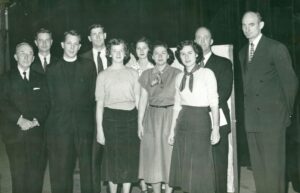“In all the days of our years as a college, we have been mindful of the fact that, although a State institution and thereby bound by the American tradition of separation of Church and State, religion has a place of supreme importance in the life of every individual. Believing that a college carries the responsibility, beyond imparting knowledge and developing skills, of fostering spiritual understanding and growth, we offer a varied program of religious activity and interests.” — Dean of Administration Walter Clinton Jackson, 1943
Religious activities did indeed hold a prominent place in the University’s landscape from its opening in 1892. The Y.W.C.A. was a prominent fixture on campus, official University Sermons were given by local and out-of-town religious leaders, the college distributed Bibles to seniors at commencement (until 1930), and many religious student groups were formed.
In the 1930s and 1940s, religious activities were particularly integrated into campus life. Students in 1932 formed the Inter-Faith Council as a way of “foster[ing] understanding, cooperation, joint activity and the development of a sense of unity in diversity among the student religious organization.” The Inter-Faith Council consisted of two student representatives and the faculty/staff advisor of each of the student religious organizations on campus. They hosted speakers from a broad spectrum of religious backgrounds, held campus vespers services, published a religious handbook for students, and led dormitory devotions.
Also, at the same time that Dean of Administration Walter Clinton Jackson led an (ultimately unsuccessful) fundraising drive to construct a campus chapel building, a group of students in 1939 organized the first annual Religious Emphasis Week. Religious Emphasis Week ran from October 22-27 and featured seminars, lectures, discussions, and special group meetings selected from a poll of the student body. Selected topics of focus included “What Can Be Accomplished by Prayer?,” “A Christian Philosophy of Life,” “Religious Basis for Social Action,” and “Religious Resources for Personal Living.” Rabbi Edward L. Israel of Har Sinai Congregation and Baltimore delivered the Thursday evening address in Aycock Auditorium on “Religion and Abundant Living.” Religious Emphasis Week continued until 1953 when it was renamed the Inter-Faith Forum.
While religious activities were plentiful on the WC campus, there were official regulations outlining the role of the students and the administration in planning and facilitating these activities. Five key points guided the policies on religious activities on campus:
- “All religious groups should be given impartial opportunity to function on campus according tot he vitality of the particular group.”
- “The initiative for religious activities on campus should … mainly rest with the various denominational or recognized non-sectarian groups rather than with the college administration.”
- “Emphasis of the entire religious program should be to relate the individual to the church of her choice.”
- “College regulations with respect to requests for scheduling of events on campus, use of college property, and student government and administrative rules are to be observed.”
- “Groups which are political, economic, or sociological in purpose but which are not religious either in the denominational or inter-faith respect are not to be placed under the authority of the Religious Activities office.”
The goal of the policies was to make “religion a real and natural part of her life while at WC rather than merely an additional college ‘activity.'”
The Religious Activities Center served as the central administrative hub for all of the student-led religious activities and groups. The Center was located on the third floor of Elliott Hall, and included the office of the Inter-Faith Council president, the office of the Coordinator of Religious Activities (a University-hired position), and a large room in which group meetings could be held. A 1957 brochure about religion at WC noted that the Center’s “lovely surroundings afford a quiet place for meditation.”
In the early 1960s, the position of Coordinator of Religious Activities was no longer funded, and the activities related to organizing the campus religious groups were folded into the work of the Dean of Students. By 1971 (ironically the year of the founding of the Department of Religious Studies), UNCG’s course bulletin no longer listed information about religious activities on campus.
By Erin Lawrimore


